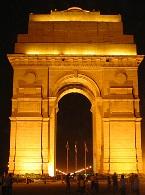 It's a question a lot of people around the world are going to ask this winter, says Sanjaya Baru.
It's a question a lot of people around the world are going to ask this winter, says Sanjaya Baru.
Intervening in the debate on the motion of confidence in the Lok Sabha on July 22, 2008, Congress party general secretary Rahul Gandhi famously said: "It is important that we stop worrying about how the world will impact us...and think about how we will impact the world."
He was, of course, paraphrasing former United States President John Kennedy's historic inaugural speech ("ask not what your country can do for you, ask what you can do for your country"), but he got it right. India's political leadership is going to be increasingly asked the question, "What can India do?"
Less than a month from now, US President Barack Obama will perhaps be quoting Mr Gandhi to the Indian Parliament and ask what can "rising India" do for an economically distressed United States in return for all the things New Delhi seeks from it.
It's not just the US, but other powers and most of India's neighbours also want to know. Even long-standing friends like the Russians now use that old World Bank line, there's no free lunch! The French and the Japanese have been transactional for years.
In a column in Business Standard, former Indian foreign secretary Shyam Saran warned of such expectations from India when he drew attention to the burden of having become a "premature power".
"India's relative power globally has outstripped the indices of personal and social well-being, unlike in the established industrialised powers, where they have historically moved in sync," agonised Mr Saran, warning that despite being a developing country with the world's largest number of poor, India's impressive economic performance and its relevance to Asian security architecture will mean that India will have to contribute to solving the problems of the world, even as it expects others to help it solve its own problems.
Last week's exuberance about India in the International Monetary Fund's (IMF's) World Economic Outlook (WEO) 2010, with a growth forecast of 9.7 per cent, is not going to help change the topic.
The message from the WEO is clear - China, Brazil and India, along with other fast-growing "emerging markets" will be expected to share some of their prosperity with the world. Mr Obama will want a piece of their growing cake.
If India wants to sit at global high tables, be it the boards of the IMF and the World Bank or the UN Security Council, India will have to let the world know what it can bring to the table.
That is a question that all the other important visitors to New Delhi this winter will ask. The list of such visitors is growing longer and now includes Russian President Dmitry Medvedev, French President Nicholas Sarkozy and Chinese Premier Wen Jiabao.
Arriving in India days after the expected defeat in elections to the US Congress, with unemployment in near double-digits and fears of a double-dip recession, with no magic wand to wave in Afghanistan-Pakistan, Mr Obama will have a longer list of demands than any other US president who has visited India before.
To be sure, Mr Obama's wish list for India will not be as daunting as the one he has for China. At a time when India's rupee is appreciating and India is buying more from the US, Mr Obama is not going to harass India's macroeconomic authorities the way he is China's mercantilists.
The contrast in the recent vote in the US House of Representatives and US Senate on two different Bills, one aimed to punish China and the other that would have hurt India, is telling.
The US House of Representatives passed the Currency Reform for Fair Trade Act, 348 to 79, as a warning to China, but the US Senate shied away from a similar warning to India, voting out an anti-outsourcing legislation, 53-45. But such bonhomie may not last unless India can offer something in return.
Merely throwing first principles at the Americans, like Finance Minister Pranab Mukherjee and Commerce and Industries Minister Anand Sharma have been doing, lecturing the US on protectionism, is not going to help.
The US and the EU are engulfed by a dark mood. They are desperately looking for sunshine to pierce through the dark clouds that they see gathering. Can India offer a ray of hope?
It is, of course, unfair for the world's rich to ask India to share its sunshine with them.
Unlike mercantilist China, India does not enjoy a huge trade surplus with which it can shop around the world. In fact, India is chronically trade deficit and the current-account deficit is rising.
The rupee's recent appreciation will certainly help encourage imports and India's rising defence budget, and plans for nuclear energy development, can also help.
Indian software companies are doing their bit to create more jobs in the US. But there are limits to a purely transactional relationship between the world's most powerful and developed economy and a rising developing country.
There is, however, one option for India, albeit a limited one. It can change the terms of the debate, making it less transactional and more strategic. As the world's most successful developing country democracy that has stayed the course over 60 years as a plural and secular democracy, India has a strategic stake in strengthening plural and secular democracies in her own neighbourhood, not to mention the world.
The US and India can work with other like-minded plural and secular democracies in building a safer world. That, in turn, can help restore the growth momentum in the West.
If India gathers confidence in its ability to impact the world, it may also widen its options in what it can do for the world.